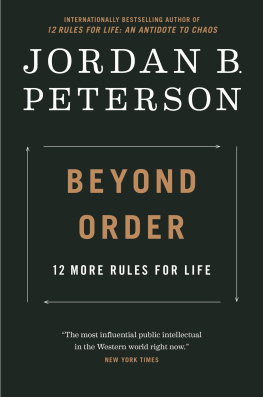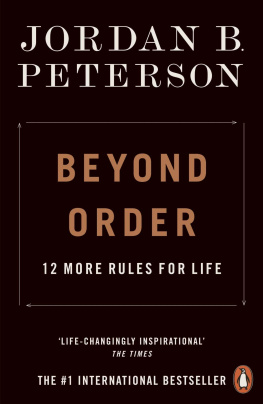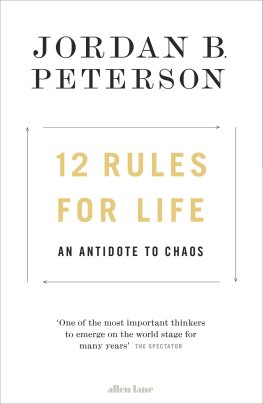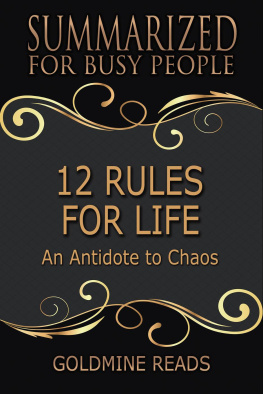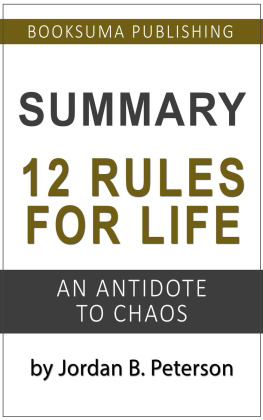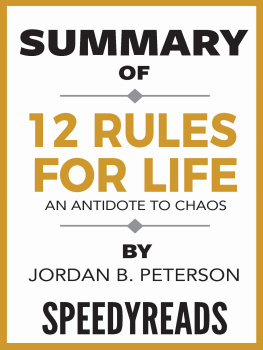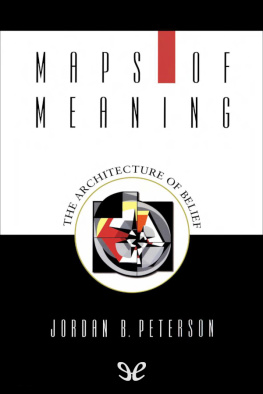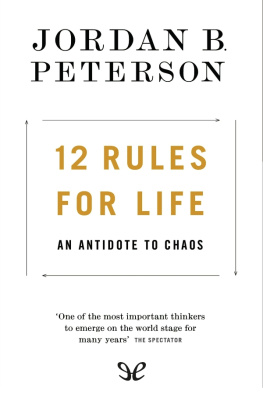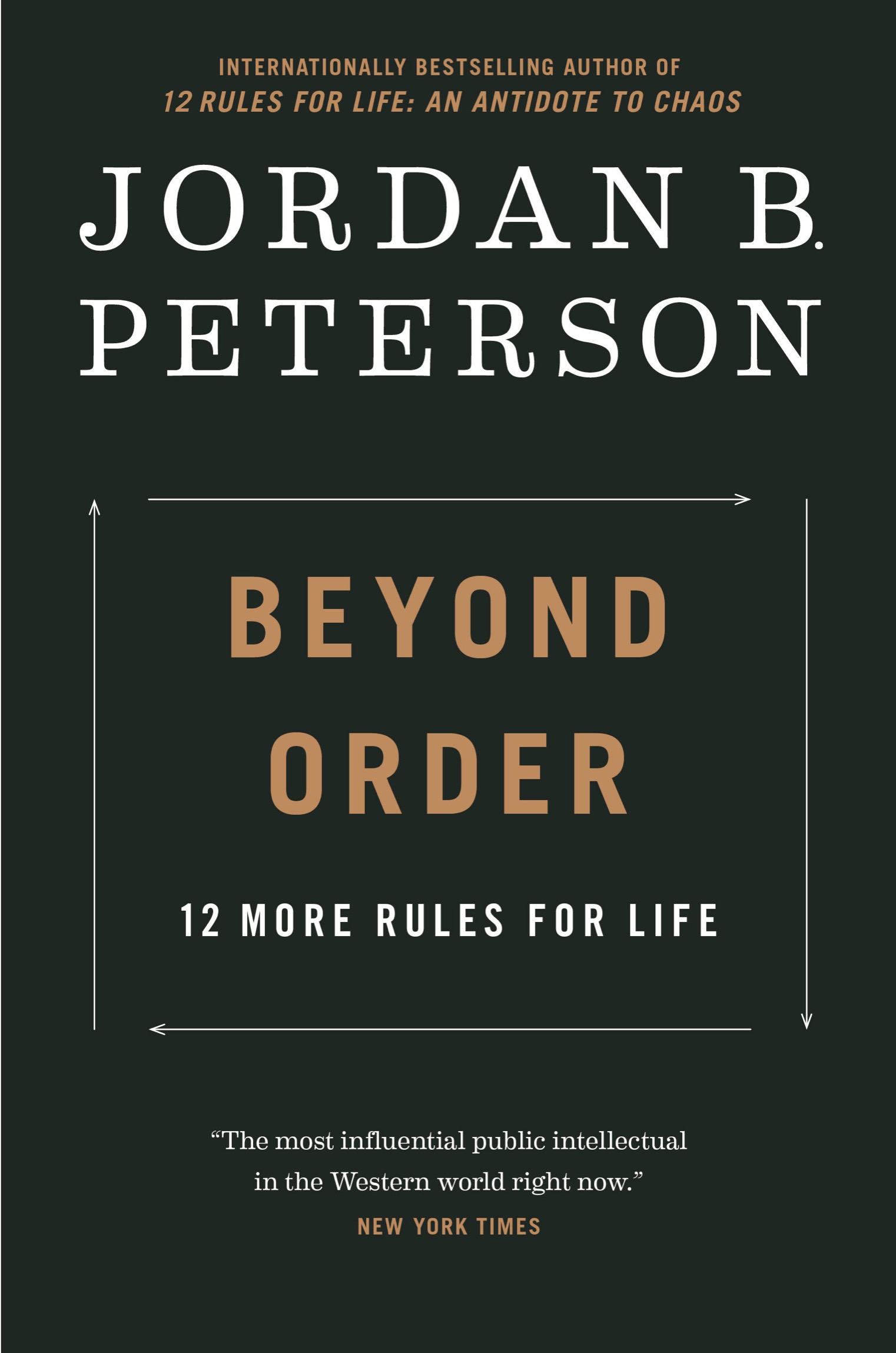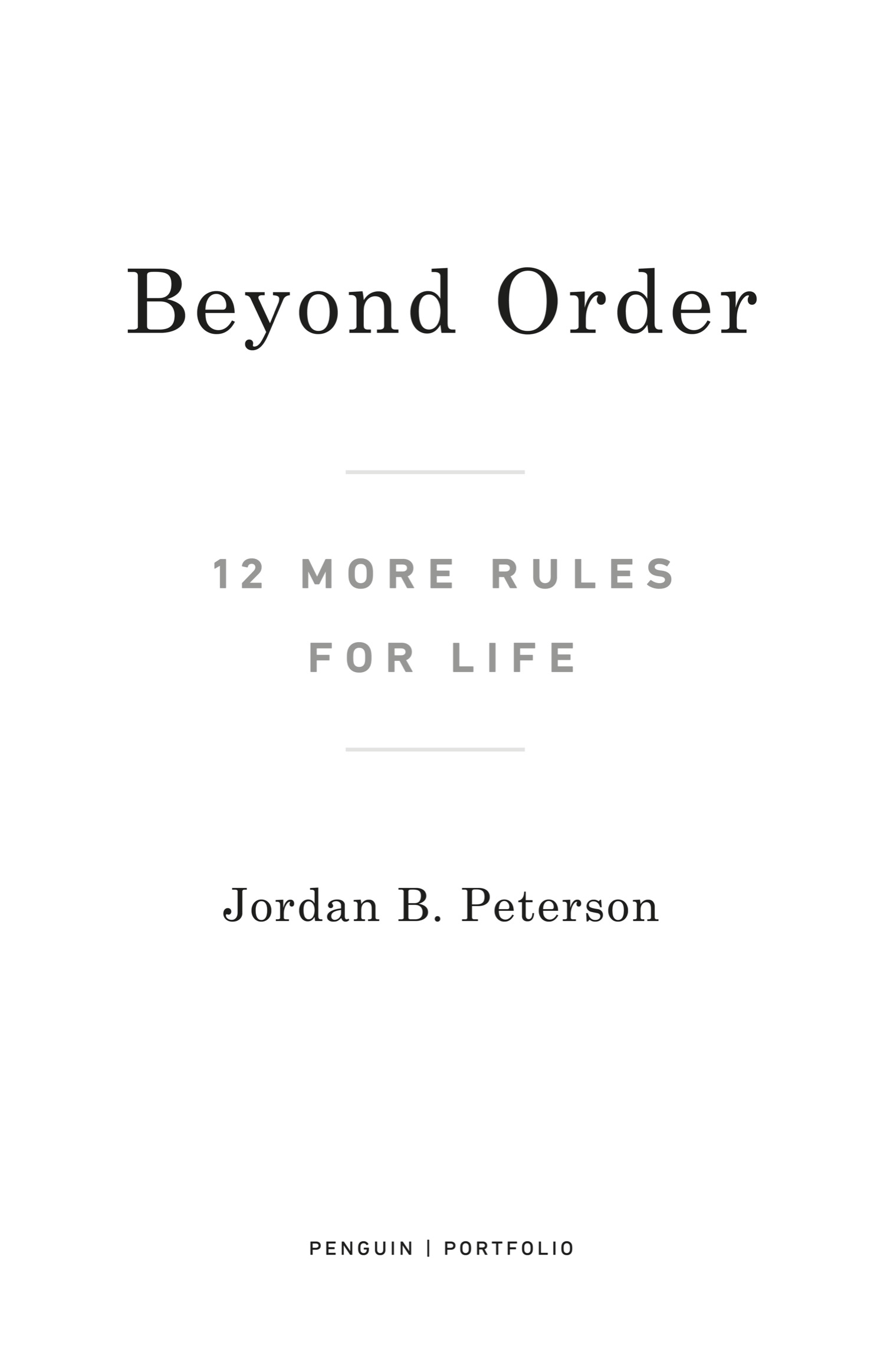ALSO BY JORDAN B. PETERSON
Maps of Meaning: The Architecture of Belief
12 Rules for Life: An Antidote to Chaos

PORTFOLIO / PENGUIN
An imprint of Penguin Random House LLC
penguinrandomhouse.com
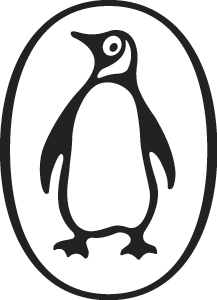
Copyright 2021 by Dr. Jordan B. Peterson
Penguin supports copyright. Copyright fuels creativity, encourages diverse voices, promotes free speech, and creates a vibrant culture. Thank you for buying an authorized edition of this book and for complying with copyright laws by not reproducing, scanning, or distributing any part of it in any form without permission. You are supporting writers and allowing Penguin to continue to publish books for every reader.
ISBN 9780593420164 (export edition)
Library of Congress Cataloging-in-Publication Data
Names: Peterson, Jordan B., author.
Title: Beyond order : 12 more rules for life / Jordan B. Peterson.
Description: [New York, New York] : Penguin ; Portfolio, [2021] | Includes
bibliographical references and index.
Identifiers: LCCN 2020036330 (print) | LCCN 2020036331 (ebook) | ISBN 9780593084649 (hardcover) | ISBN 9780593084656 (ebook)
Subjects: LCSH: Conduct of life.
Classification: LCC BJ1589 .P446 2021 (print) | LCC BJ1589 (ebook) | DDC 170/.44dc23
LC record available at https://lccn.loc.gov/2020036330
LC ebook record available at https://lccn.loc.gov/2020036331
All names and identifying characteristics have been changed to protect the privacy of the individuals involved.
pid_prh_5.6.1_c0_r0
To my wife, Tammy Maureen Roberts Peterson, whom I have loved deeply for fifty years, and who is admirable, in my estimation, in all regards, and beyond all reason.
Contents
Table of Illustrations
The Fool: Inspired by Pamela Colman Smith, The Fool, from the Rider-Waite Tarot card deck, Rider & Son (1910).
Materia Prima: Inspired by Hermes Trismegistus, Occultaphilosophia (1613). Also from H. Nollius, Theoria philosophiae hermeticae (Hanoviae: Apud P. Antonium, 1617).
St. George and the Dragon: Inspired by Paolo Uccello, Saint George and theDragon (ca. 1458).
Atlas and the Hesperides: Inspired by John Singer Sargent, Atlas andthe Hesperides (ca. 19221925).
Fallen Angel: Inspired by Alexandre Cabanel, Fallen Angel (1847).
In our Communal Farm: Inspired by B. Deykin, In Our Communal Farm,There Is No Place for Priests and Kulaks (1932).
Apprentice: Inspired by Louis-Emile Adan, Apprentice (1914).
Irises: Inspired by Vincent Van Gogh, Irises (1890).
The Temptation of St. Anthony: Inspired by Martin Schongauer, TheTemptation of Saint Anthony (ca. 14701475).
The Love Drink: Inspired by Aubrey Beardsley, How Sir TristramDrank of the Love Drink (1893).
Satan: Inspired by Gustave Dor, Satan, from John Milton, Miltons Paradise Lost, with illustrations by Gustave Dor (London: Cassell & Company, Ltd., 1905).
St. Sebastian: Inspired by Martin Schongauer, Saint Sebastian (ca. 1480).
A Note from the Author in the Time of the Pandemic
It is a perplexing task to produce a nonfiction book during the global crisis brought about by the spread of COVID-19. It seems absurd, in some sense, even to think about anything else but that illness during this trying time. Nonetheless, binding all the thoughts contained in any current work to the existence of the pandemicwhich too shall passseems like an error, as the normal problems of life will return at some point (and thankfully) to the forefront. That all means that an author of the present day is inevitably going to make one mistake (concentrating too much on the pandemic, which has an uncertain life span, and producing a book that is instantly dated, in consequence) or another (ignoring the pandemic, which is very much like failing to attend to the proverbial elephant under the rug).
After considering this, as well as discussing the issues with my publishers, I decided to write Beyond Order: 12 More Rules for Life according to the plan laid out for it several years ago, and to concentrate on addressing issues not specific to the current time (thus, to risk the second error rather than the first). I suppose it may also be the case that those who have chosen to read this book or listen to the audio version might be relieved to turn their attention to something other than the coronavirus and the devastation it has wrought.
Overture
On the fifth of February 2020, I awoke in an intensive care ward in, of all places, Moscow. I had six-inch tethers attaching me to the sides of the bed because, in my unconscious state, I had been agitated enough to try to remove the catheters from my arm and leave the ICU. I was confused and frustrated not knowing where I was, surrounded by people speaking a foreign language, and in the absence of my daughter, Mikhaila, and her husband, Andrey, who were restricted to short visiting hours and did not have permission to be there with me at my moment of wakening. I was angry, too, about being there, and lunged at my daughter when she did visit several hours later. I felt betrayed, although that was the furthest from the truth. People had been attending to my various needs with great diligence, and in the wake of the tremendous logistic challenges that come about from seeking medical care in a truly foreign country. I do not have any memory of anything that happened to me during the most recent weeks preceding that, and very little between that moment and my having entered a hospital in Toronto, in mid-December. One of the few things I could recall, looking back to the earliest days of the year, was the time I had spent writing this book.
I wrote much and edited almost all of Beyond Order during a time when my family was plagued by sequential and overlapping bouts of seriously impaired health, much of which was the subject of public discussion, and for that reason requires some detailed explanation. First, in January 2019, Mikhaila had to seek out a surgeon to replace much of her artificial ankle, implanted about a decade earlier, as the initial installation was never perfect, causing her serious pain and trouble with movement as a consequence, and then came near to failing. I spent a week with her at a hospital in Zurich, Switzerland, for the week of that procedure and her initial recovery.
At the beginning of March, my wife, Tammy, underwent routine surgery in Toronto for a common and eminently treatable kidney cancer. A month and a half after that surgery, which involved the removal of one third of the organ in question, we learned that she was actually suffering from an extremely rare malignancy, which had a one-year fatality rate of close to 100 percent.
Two weeks later, the surgeons involved in her care removed the remaining two thirds of her afflicted kidney, along with a substantial proportion of the related abdominal lymphatic system. The surgery appeared to bring the progression of the cancer to a halt, but produced leakage of fluid (up to four liters, or one gallon, a day) from her now-damaged lymphatic systema condition known as chylous asciteswhich rivaled the original condition in danger. We journeyed to see a medical team in Philadelphia, where within ninety-six hours of the initial injection of a poppy seed oil dye, whose practical purpose was the enhancement of images derived from CAT or MRI scans, the complete cessation of Tammys fluid loss was achieved. This breakthrough occurred on the very day of our thirtieth wedding anniversary. She recovered rapidly and, to all appearances, completelya testament to the luck without which none of us can live, and to her own admirable strength and resistance.

